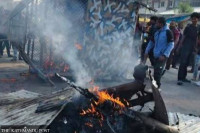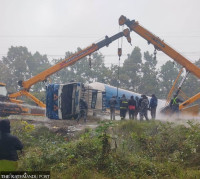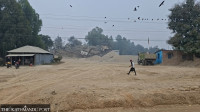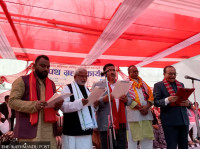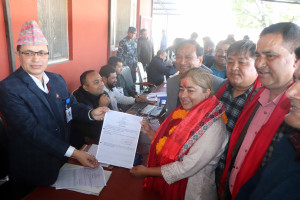Madhesh Province
Poachers call the shots in Rautahat forests for lack of monitoring
The forest rangers are unequipped to fight off armed poachers, forest officials say.
Shiva Puri
An injured blue bull (Boselaphus tragocamelus) was found near Bakya river at Chandranigahapur Division Forest in Dewahi Gonahi Municipality, Rautahat last Thursday.
The Chandranigahapur Division Forest is spread across all 18 municipalities of Rautahat and is divided into seven sub sectors—Chetnagar, Judibela, Hiley Khola, Dhansar, Jungle Saiya, Chocha and Banbohari. The head office of the Division Forest Office is located in Chandranigahapur Municipality.
The injured bull was rescued by a joint team of forest officials and local police and sent to Parsa National Park for treatment and rehabilitation. The location where the injured bull was found is around 115 km from the national park.
According to Amar Dev Yadav, acting chief of the Division Forest Office, the bull has sustained injuries from spear stabs on his eyes and back.
The attacker must have wounded the bull while it was grazing by the Bakya river, says Yadav. “The injured blue bull is being treated at Parsa National Park and will be released inside the park after recovery,” said Yadav.
“We are aware of illegal poaching activities in the area but the division forest alone cannot stand up to armed poachers. Although our forest rangers monitor the forest areas, it’s not possible to keep track of all activities in the forest,” he said.
According to the Division Forest Office, poachers set up ambushes using guns, spears and traps to capture blue bulls, wild boars, deer, and other wild animals who come out of the forest and to the nearest fields to graze.
“Blue bull is being hunted for its meat. Poachers sell its meat in the local market as deer meat,” said Yadav. “A week and a half ago, a forest patrol team in the Chetnagar area came across a group of armed poachers with a dead wild boar. They were in the process of butchering the bull when we found them.”
According to people living around the Chetnagar area, poachers are killing wild animals every day and are most active in the western part of the Chandranigahapur Division Forest.
“During this season, wild animals, including blue bull, wild boar and deer, come out of the forest to graze in the pastures. That’s when the poachers hunt them,” said Yadav.
Civil society leader from Rautahat Saput Bahadur Karki demands strict action against poachers for the conservation of wildlife in forest areas.
“We cannot control illegal activities in the forest if we do not take strict action against poachers and those who sell wild animal parts. Wild animals are being killed every day and shops are selling their meat out in the open. This butchery has to stop,” said Karki.
According to Karki, a meeting was recently held among Nepal Army, Nepal Police and Armed Police Force at the Division Forest Office to discuss possible measures to curb the poaching of wild animals in the forest. But the meeting did not bear tangible results, he said.
“They only talked about the issue but did not decide any concrete measures to stop poaching in the forests,” he said.
According to forest officials, a month ago, three hunting rifles were recovered from Chocha and Banbohari forest areas. Several wild animals were shot although the forest office does not have any data on the actual number of killings. On April 15, 2021, a forest team had recovered three hunting rifles from the same area.
The availability of weapons has emboldened the poachers to continue with illegal activities, says Amar Dev Yadav from the Division Forest Office.
“Unless the authorities curb the production and use of illegal weapons, it will be difficult to stop the poachers,” said Yadav.
Two decades ago, Dron Prasad Neupane, subedar of the Armed Forest Guard, and Bhoj Bahadur Ghimire, a forest ranger at the then District Forest Office in Chandranigahapur Municipality, were shot dead by poachers.
“The forest rangers are not equipped to deal with armed poachers,” said Yadav. “Monitoring forest areas is a risky task and it needs the involvement of armed security personnel. The dry season, when the forests experience wildfires, is when the poachers are most active. The wildfires drive the animals out of the forest cover and into the open, exposing them to poachers lying in wait. Immediate measures need to be taken if we are to stop poachers from killing wild animals this dry season.”




 11.12°C Kathmandu
11.12°C Kathmandu

